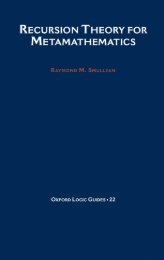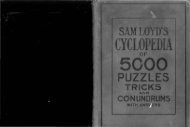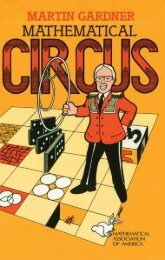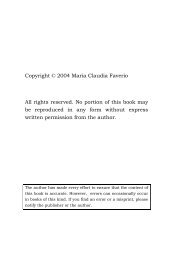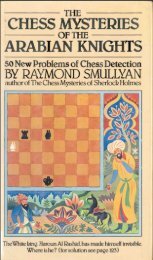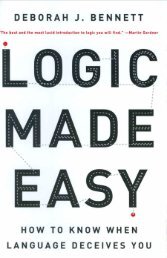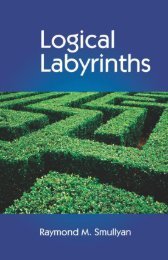Which Alice?
Which Alice?
Which Alice?
You also want an ePaper? Increase the reach of your titles
YUMPU automatically turns print PDFs into web optimized ePapers that Google loves.
Solutions to the Puzzles<br />
for example, he was told that A told the truth and that B and C both<br />
lied. Then whoever A accused was guilty (since A told the truth), so<br />
he might have accused B (in which case B was guilty) and B and C<br />
both lied and accused A (or maybe B accused C, and C accused A).<br />
On the other hand, it could be that A accused C and that B and C<br />
both accused A, in which case C was guilty. So if A was the only one<br />
who told the truth, then either B or C could be guilty. Similarly, if B<br />
was the only one who told the truth, then either A or C could be<br />
guilty, and if C was the only one who told the truth, then either A or<br />
B could be guilty. So if the White King had been told either that A<br />
was the only one who told the truth, or that B was, or that C was, he<br />
could never have known who was guilty. So he was not told any of<br />
these three things.<br />
Could he have been told that all three told the truth? No, this is<br />
impossible, because the guilty one certainly lied (since he accused<br />
one of the others, and both the others were innocent).<br />
This leaves only the case that exactly one lied. Well, if exactly one<br />
lied, then the one who lied must be the guilty one, because if an<br />
innocent one lied, that would make two lies—his and the guilty<br />
one's. So, therefore, the White King was told one of three things:<br />
Case 1: A lied, B told the truth, C told the truth.<br />
Case 2: A told the truth, B lied, C told the truth.<br />
Case 3: A told the truth, B told the truth, C lied.<br />
We now see how the White King knew who was guilty, but how<br />
can we know, since we don't know which of the three cases the King<br />
was told? Well, Humpty Dumpty either asked the White Knight<br />
whether any two consecutive statements were false, or he asked<br />
whether any two consecutive statements were true. The first<br />
question would have been a pointless one (since there is only one<br />
false statement), and had he asked it, the answer would have been<br />
no, and this wouldn't have enabled Humpty Dumpty to know which<br />
of the three cases held. So Humpty Dumpty asked whether any two<br />
consecutive statements were true. Had he been told "Yes," he would<br />
have ruled out Case 2, but couldn't have known who was guilty. But<br />
Humpty Dumpty did know, so he must have gotten No for an<br />
answer and then realized that Case 2 must be the one; so B is guilty.<br />
175




